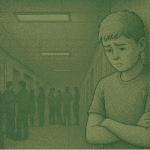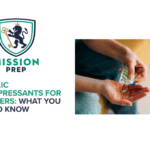When a friend or peer is experiencing depression, it can be really tough to know what to do. As teens, you might feel unsure about how to help or afraid of saying the wrong thing. It’s totally normal to feel that way—depression is a serious issue that affects many adolescents, and it can make those around them feel uncertain about how best to support them. However, even though you may not be able to “fix” the problem, your support can make a huge difference.
At Mission Prep, we understand how important it is for teens to receive the right kind of support from their friends and loved ones. Sometimes, just knowing that someone cares can make a tough situation more manageable. If you’re wondering how to support a friend or classmate who is dealing with depression, here are some helpful ways to be there for them, along with suggestions on what to say.
1. Be Present and Listen
Depression can make teens feel like they’re all alone, even if they’re surrounded by people. Simply being there for your friend or classmate and listening can go a long way. You don’t have to know exactly what to say—just letting them talk or be themselves without any pressure is often the best way to show you care. Even if your friend doesn’t feel like talking, sitting with them in silence can still be comforting.
What you can say:
“I’m here for you, no matter what.”
“You don’t have to go through this alone. I’ll listen whenever you’re ready.”
“It’s okay if you don’t want to talk right now. I’m still here for you.”
2. Don’t Try to Fix It
While it’s natural to want to cheer your friend up or help them “get over” their sadness, depression isn’t something you can fix with a quick conversation or a fun day out. It’s important to understand that depression is a serious mental health condition, not just feeling sad or down for a while. Instead of trying to fix things, focus on being supportive and showing that you care, no matter what your friend is going through.
What you can say:
“I know things are really tough for you right now, and I’m sorry you’re going through this.”
“I don’t have to understand everything, but I want to be here for you.”
“It’s okay to feel this way. I’m here, and I’m not going anywhere.”
3. Offer Small, Gentle Suggestions
Sometimes, teens with depression struggle with everyday things, like getting out of bed, going for a walk, or eating. While you can’t push your friend to do more than they’re able to, offering gentle suggestions for small, manageable activities can help. If they’re up for it, you can suggest doing something together that doesn’t require a lot of energy but can still make them feel connected.
What you can say:
“How about we go outside for a little while? It might help both of us feel better.”
“I’m going to grab something to eat. Want to join me?”
“Let’s hang out and watch a movie together. We don’t have to talk if you don’t want to.”
4. Be Patient
Depression doesn’t go away overnight, and your friend may not always act the way they used to. They might cancel plans, stop responding to texts, or seem distant. It’s important to be patient and keep reaching out, even if they seem uninterested. Sometimes, just knowing that someone is still there for them can make a big difference, even if they don’t respond right away.
What you can say:
“I understand if you’re not feeling up for hanging out right now, but I’m here when you’re ready.”
“Just wanted to check in and see how you’re doing. No pressure to respond—I just wanted to let you know I’m thinking of you.”
“I’m not going anywhere. I care about you, and I’m here for the long haul.”
5. Encourage Them to Get Help
While your support is important, professional help is often needed to treat depression. Encourage your friend to talk to a therapist or counselor who can help them manage their feelings. Offer to help them find someone to talk to or even go with them if they’re nervous. Seeking help isn’t a sign of weakness—it’s a sign of strength and courage.
What you can say:
“It might help to talk to someone who knows how to help you through this. I can help you find a therapist if you want.”
“You don’t have to handle this all on your own. Getting help can make things easier.”
“If you ever want to talk to someone, I can come with you so you don’t have to do it alone.”
6. Take Care of Yourself, Too
Supporting a friend with depression can be emotionally draining, so it’s important to take care of yourself as well. Make sure you’re setting boundaries and finding time to focus on your own mental health. Remember, you can’t help someone else if you’re not in a good place yourself. If you’re feeling overwhelmed, it’s okay to talk to a counselor or trusted adult about what you’re going through.
What you can remind yourself:
“It’s okay to take breaks and focus on my own mental health, too.”
“I’m doing my best to help my friend, but I need to take care of myself as well.”
“It’s okay to ask for help for myself if I need it. I can’t support someone else if I’m struggling.”
Helping a friend or classmate with depression can feel like a lot to handle, but remember, you’re not alone in this. Your support can mean the world to a friend who feels like they’re all by themselves. Sometimes, just showing up and being there consistently can help them feel a little more hopeful, even if the road to recovery is long.
If you or someone you care about is struggling with depression, it’s important to reach out for help. At Mission Prep, we’re here to provide guidance and support for adolescents dealing with depression and other mental health challenges. You don’t have to navigate this alone—our team is ready to help teens find the path to healing and recovery.





















